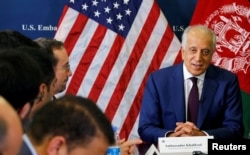A top Russian diplomat is in Pakistan to discuss efforts to promote direct peace talks between warring sides in neighboring Afghanistan.
Russian presidential envoy for Afghanistan Zamir Kabulov is visiting Islamabad after last week’s marathon talks between U.S. special representative for Afghan reconciliation Zalmay Khalilzad and the Taliban in Qatar. Pakistan says it has arranged the ongoing direct peace dialogue between U.S. and Taliban envoys.
“Regional countries have genuine stakes and concerns and would continue to exchange views on the evolving Afghan situation,” a senior Pakistani official told VOA when asked about issues they expected to come under discussions in meetings with Kabulov.
The Russian envoy will begin official meetings with Pakistani foreign ministry counterparts on Tuesday, said the official, requesting anonymity.
Russia is making its own efforts to try to bring the Taliban and the Afghan government to the negotiating table, fearing continued Afghan instability will threaten central Asian allies that share a border with the war-hit country.
Under the so-called Moscow format conference held in the Russian capital last November, the Taliban for the first time sent its top peace negotiators to attend and publicly interact with participants as well as media. But the insurgent group refused to engage in direct conversations with Afghan representatives present at the table. The Taliban continues to do so even during meetings with Khalizad.
The insurgent group says an intra-Afghan dialogue is something that Afghans themselves have to arrange and promises to engage in such a process once U.S. and NATO forces leave the country.
Russian Foreign Ministry spokeswoman Maria Zakharova told reporters last week her country welcomes Washington’s resolve to launch an Afghan peace process, but Khalilzad’s attempts to convince the Taliban to sit down with the Kabul government have failed.
She touted Russia’s success in bringing under one roof key parties to the conflict, saying the Moscow format was “optimal for consultations” on Afghanistan and it “achieved greater success than the United States alone.”
“We also intend to continue holding Moscow meetings together with our partners and look forward to the United States actively joining them as a full participant, to facilitate the early start of a peaceful dialogue between the Government of Afghanistan and the Taliban Movement,” Zakharova said.
Pakistan and Russia, as well as neighboring Iran maintain contacts with the Taliban, insisting they are meant to encourage the insurgents to resolve the prolonged Afghan war through a peaceful dialogue.
The Taliban and Khalilzad said they made progress in Doha last week, agreeing in principle to the framework of a peace agreement that would require guarantees from insurgents not to allow terrorists to to use Afghan soil for attacks against America. The understanding would bind the United States to withdraw all its troops from Afghanistan provided the Taliban cease hostilities and open talks with Kabul to end the war.
U.S. and Afghan officials have long accused Islamabad of providing sanctuaries and sheltering Taliban leaders, allegations Pakistani official reject as baseless. U.S. military officials lately have also accused Tehran of providing military assistance to the Taliban to fuel instability in Afghanistan, Iranian officials reject the charges.
Russia and Iran worry that continued Afghan instability is encouraging regional affiliate of Islamic State, known as Khorasan Province (ISK-P), to expand its influence in the turmoil-hit nation and threaten territorial boundaries of neighboring countries.






